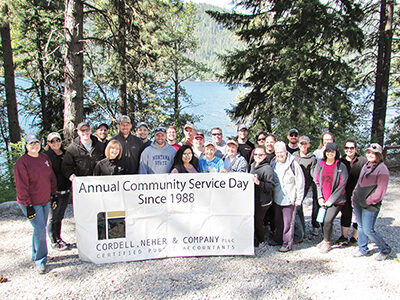When Employees Steal
Know the signals that could hint at theft or embezzlement at your business.
Provided by Brenda Alcala, CPA at Cordell, Neher & Company, PLLC
 Weird things are happening at work. Power tools are missing. Something seems odd with your inventory. Bank reconciliations seem slightly amiss.
Weird things are happening at work. Power tools are missing. Something seems odd with your inventory. Bank reconciliations seem slightly amiss.
Follow up on your suspicions. You may have a problem with employee theft. Small businesses are more likely to have employee theft because 1) they are not large enough to provide the resources, controls and processes needed to decrease the risk; and 2) as a small business you know everyone and tend to be more trusting of your employees so, of course they would never steal, right? Wrong. Often those who end up stealing are the employees you trust the most.
What are the signs that you might have a thief at work? If enough items vanish from the office, the problem is clear – but some subtle clues may appear beforehand. Employee theft is not a one-time event by an employee, but usually involves stealing small amounts over a period of time that can add up to thousands, if not millions, of dollars if not caught in time.
Watch for an employee who consistently stays late – especially one with access to a warehouse or financial records. If he or she never wants to take any vacation time or frequently comes in over the weekend to “finish up a project,” that may also be another hint. In the same vein, watch out for workers who volunteer to collect receivables or make weekly cash deposits for you. On a more sophisticated level, picture two or more of your employees (one who can greenlight expenses among them) creating a phony supplier (vendor fraud), with checks being authorized and written to that shell company. In an article by CNBC, 14.7% of thefts were due to vendor fraud (money theft was #1 at 34.5%). While less common, it accounts for the largest loss of funds compared to any other form of theft.
What could tip you off to employee theft? Consider the person’s life away from work. Is this person dealing with financial hardship or a divorce? Does he or she like to live extravagantly? Is he or she close with certain suppliers, customers, or clients?
Who is the typical embezzler? Not some young new hire, but more likely a mature and trusted manager or financial officer. In a 2016 survey of firms impacted by white-collar crime, specialty insurer HISCOX arrived at a portrait of an embezzler: median age of 49, with a 56.3% chance of being female. Unsurprisingly, 40% of such crimes were committed by those working in finance and accounting departments.
HISCOX also found that 80% of embezzlement happened at firms with 150 or fewer workers. Notably, the embezzlement rate at companies of this size was ten times higher than at firms with 250-500 employees.
Why is embezzling from a small company easier than stealing from a large one? For one, many small businesses are started by friends or family; the principals trust each other and can readily access company finances, intellectual property, and sensitive employee information. Then, the business grows and outsiders are gradually able to enter this circle of trust – and the internal checks and balances do not keep pace with the growth.
By the way, non-profits are especially susceptible to theft. Why? You can cite a couple of factors. One, leaders of non-profit organizations tend to be good-hearted and altruistic and may not want to acknowledge that they could have embezzlers or thieves coming to work. Criminally minded individuals can sense this optimism and act on it. Two, internal controls at non-profits are often lacking or minimal; the leaders of these groups devote resources, time, and effort primarily to the mission of the organization. Whether you are a for-profit or non-profit organization, it is important to set clear policies and expectations of your employees and the consequences of committing employee theft.
Are you insured against any of this? Your current insurance policy may provide your business with fidelity coverage, also known as fraud insurance. If it does not give you that coverage, find one that does. You have enough things to deal with at your business. When fraud and theft occur, you don’t want to be left financially liable or distressed.
How do you recover? Recovering from employee theft is hard, and for some companies, can take years. The best thing to do is tell the police so others are aware of such person, and communicate with your employees what happened so they are aware of the consequences of such actions and implement improved controls to make sure it does not happen again in the future.
Brenda Alcala is a Certified Public Accountant with Cordell, Neher & Company, PLLC, a Wenatchee public accounting firm. Brenda may be reached at 509-663-1661 or brenda@cnccpa.com. www.cnccpa.com
Events & Deadlines
Latest Past Events
Community Service Day
Cordell Neher & Company, PLLC 175 E Penny Rd #1, Wenatchee2024 Shred Event
Cordell Neher & Company, PLLC 175 E Penny Rd #1, WenatcheeCNC Newsletter
Subscribe and stay informed on policy changes that could have an impact on you.
Footer Contact
Check the background of your financial professional on FINRA's BrokerCheck®
Privacy & Usage: The information on the Cordell, Neher & Company, PLLC website is provided with the understanding that it should not be substituted, in any way, for consultation with a professional Certified Public Accountant, accountant, tax, legal or other competent advisor. Cordell, Neher & Company, PLLC makes every attempt to ensure that the information contained on their websites are obtained from reliable sources, but is not responsible for any errors and/or omissions or from the results obtained from the use of any information. This site contains links to servers maintained by other organizations. Cordell, Neher & Company, PLLC cannot provide any warranty regarding the accuracy or source of information found on any of these servers, the content of any file the user might use to download from a third-party site, and is not responsibility for the content found on any of these servers or for any links these servers maintain with other servers.
Securities offered through Cetera Wealth Services LLC, member FINRA/SIPC. Advisory Services offered through Cetera Investment Advisers LLC, a registered investment adviser. Cetera is under separate ownership from any other named entity. Home offices at 175 E Penny Rd #1 Wenatchee, WA 98801; phone (509) 663-1661.
Individuals affiliated with this broker/dealer firm are either Registered Representatives who offer only brokerage services and receive transaction-based compensation (commissions), Investment Adviser Representatives who offer only investment advisory services and receive fees based on assets, or both Registered Representatives and Investment Adviser Representatives, who can offer both types of services.
© 2024 Cordell, Neher & Company PLLC • Designed by Pixel to Press











